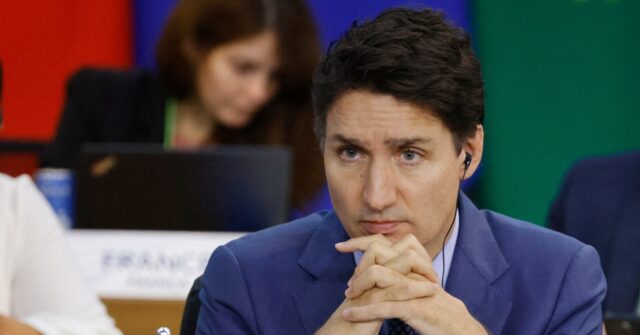Canadian Prime Minister Justin Trudeau is facing heightened political peril following the surprising resignation of Deputy Prime Minister and Finance Minister Chrystia Freeland. Known as one of Trudeau’s most dedicated allies, Freeland’s abrupt departure has sent shockwaves through Canadian politics. In her resignation letter, she outlined a significant disagreement over fiscal policy, criticizing Trudeau’s aggressive spending strategies as reckless and unsustainable. Freeland believed that remaining in her role under the current government would be disingenuous, leading her to conclude that a full resignation was the only viable option. Her departure marks a clear sign of frustration within the Liberal government and signals a potential end to their time in power.
Freeland’s resignation has become a catalyst for new calls for Trudeau’s resignation from various political leaders. Jagmeet Singh, leader of the New Democratic Party (NDP), publicly demanded Trudeau step down, highlighting Canadians’ struggles with rising living costs and the looming threat of tariffs under the incoming U.S. administration. Singh’s pressures are significant; his party has provided crucial support in past confidence votes to keep Trudeau in office. However, Singh’s tone suggests that the NDP might reconsider their support, particularly if the Conservatives make another attempt to unseat Trudeau. Bloc Quebecois leader Yves-Francois Blanchet also declared the end of Trudeau’s government and suggested the prime minister should pursue a parliamentary dissolution and call for early elections.
As the political climate becomes increasingly volatile, Conservative leader Pierre Poilievre has also ramped up rhetoric against Trudeau, labeling him as weak and disconnected from the issues facing Canadians. Poilievre’s remarks come in response to Freeland’s resignation, indicating a form of leadership crisis within the Liberal Party. He emphasizes that Canadians are losing confidence in Trudeau’s capabilities during a pivotal moment when economic stability is crucial, especially with potential tariffs threatening jobs in Canada. By framing the situation as chaotic and illustrating the sentiment that Trudeau is clinging to power despite a lack of control, the Conservative Party is positioning itself for further confrontation.
Recent polls have highlighted a worrying trend for the Liberal Party, indicating dwindling public support, which has fallen to about 21%. This decline places them at a tie with the NDP, suggesting that progressive voters may be shifting their allegiances. Observers indicate that the growing concerns regarding economic management and leadership within the Liberal Party could lead to significant electoral repercussions if changes are not implemented. Figures within the party, including some notable members, are increasingly voicing apprehensions about Trudeau’s ability to rally support and lead effectively in the forthcoming election, suggesting a re-evaluation of his leadership might be needed.
Following Freeland’s resignation, the Liberal Party held an emergency caucus meeting, where Trudeau presented a somewhat subdued image. His subsequent comments at a holiday party reflected both a need for reassurance among party members and a hint of uncertainty about his future. He sought to inspire the party members, but the questions surrounding his tenure and leadership appeared to linger unaddressed. Reports point to a growing divide within the party, with many fearing that retaining Trudeau in leadership could have damaging effects in the next electoral contest. Key figures have begun to call for new leadership as a means to restore the party’s viability and competitiveness in political polling.
As speculation about Trudeau’s potential resignation or the dissolution of Parliament spreads, the survival of his government hangs in the balance. The upcoming parliamentary address may reveal his intentions regarding the political future of his administration, which could involve expressing a willingness to step down or announcing plans for a new electoral campaign. Freeland’s resignation has created a potential shift in the power dynamics within the Liberal Party, prompting urgent discussions and reflections on what this political fallout means for Canada’s future. Ultimately, Trudeau’s ability to navigate this difficult period will determine not only his political survival but also the fate of his party as they prepare for an unpredictable electoral landscape.

